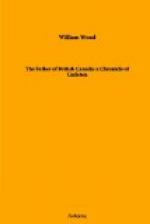The personal factors in this perhaps insoluble problem were still more refractory than the constitutional. All the great questions of peace and war and other foreign relations were settled by the mother country, which was the only sovereign power and which alone possessed the force to make any British rights respected. The Americans supplied subordinate means and so became subordinate men when they and the Imperial forces worked together. This, to use a homely phrase, made their leaders feel out of it. Everything that breeds trouble between militiamen and regulars, colonials and mother-countrymen, fanned the flame of colonial resentment till the leaders were able to set their followers on fire. It was a leaders’ rebellion: there was no maddening cruelty or even oppression such as those which have produced so many revolutions elsewhere. It was a leaders’ victory: there was no general feeling that death or independence were the only alternatives from the first. But as the fight went on, and Loyalists and revolutionists grew more and more bitter towards one another, the revolutionary followers found the same cause for hating the Loyalists as their leaders had found for hating the government. Many of the Loyalists belonged to the well-educated and well-to-do classes. So the envy and greed of the revolutionary followers were added to the personal and political rage of their leaders.
The British government had done its best for the Loyalists in the treaty of peace and had urged Carleton, who needed no urging in such a cause, to do his best as well. But the treaty was made with the Congress; and the Congress had no authority over the internal affairs of the thirteen new states, each one of which could do as it liked with its own envied and detested Loyalists. The revolutionists wanted some tangible spoils. The safety of peace had made the trimmers equally ‘patriotic’ and equally clamorous. So the confiscation of Loyalist property soon became the order of the day.
It was not the custom of that age to confiscate private property simply because the owners were on the losing side, still less to confiscate it under local instead of national authority. But need, greed, and resentment were stronger than any scruples. Need was the weakest, resentment the strongest of all the animating motives. The American army was in rags and its pay greatly in arrears while the British forces under Carleton were fed, clothed, and paid in the regular way. But it was the passionate resentment of




